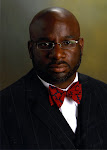 Richard S. Newman, in writing one of most comprehensive works on the life of our founder, Bishop Richard Allen, has done a marvelous job in pulling together facts and chronological events; yet, he has been able to keep the story fresh and alive. Freedom's Prophet is really a page turner and difficult to put down once you pick it up.
Richard S. Newman, in writing one of most comprehensive works on the life of our founder, Bishop Richard Allen, has done a marvelous job in pulling together facts and chronological events; yet, he has been able to keep the story fresh and alive. Freedom's Prophet is really a page turner and difficult to put down once you pick it up.This Thursday, June 19, 2008, from 5:30pm to 7, Newman will meet and greet the audience, read selected portions, and sign copies at the Library Company . Those attending the General Conference in St. Louis should also know that the book can be ordered from my exhibitor booth for a deeply discounted price (booth #125).
If I have any criticism about the book thus far, it is simply this:
Why is it that others outside of the AME Church seem to appreciate our history more than us?
The last major work published on one of the "Four Horsemen" of the AMEC was in 1992 by Stephen Angell when he wrote his biography on Bishop Henry McNeal Turner (Bishop Henry McNeal Turner and African-American Religion in the South). Like Newman, Angell is not AME. In fact, neither of them are of African descent (at least directly). We should be grateful that Newman and Angell have such a broad and open research agenda and have proven themselves as first rate scholars, but what about us?
When is someone going to write a major, comprehensive biography on the life of Jarena Lee (the next comprehensive biography on her life will be the first--thank the Lord that she wrote her own story down!)? What about those founding mothers and fathers in West and South Africa who helped shape African Methodism in the Motherland? Who will tell their story? What about the story of how the AME Church spread to other parts of the world?
Have we no one in our own ranks to tell our story? Have we no one qualified and trained to pick up the tools of research and answer the question of whence we've come? Must we always sit back and hope that others will find our history important enough to write and then interpret it for us? Do we always need someone else to tell us what it means to be AME?
Some will say that there is no audience or market for our material. However, when I recently tried to purchase some copies of Freedom's Prophet in bulk for the upcoming book signing, the warehouse had already sold out of the first printing (the book was just released in March!). Obviously, someone is reading it.
Fortunately, there are those in the ranks of the AME Church who have contributed greatly to the scholarly discourse on the history of the AME Church (Reginald Hildebrand, Theresa Fry Brown, Bernard Powers, to name a few). However, even they will say that there are far too few of us spending our precious time in research on questions involving the AME Church. Let us hope that Newman's new work on Bishop Allen (which ironically highlights his self-determination) will inspire future AME researchers, scholars, and writers to find a research agenda in one of the most fascinating places of them all, the African Methodist Episcopal Church.

3 comments:
Amen, Mark.
Dr. Mark. Thanks for directing me to your blog site. It is eye catching and the content thought provoking. I do believe there are some passionate written articles about African Methodism and some other publications written by a son or daughter of the Church of Allen. Now, I am challenged to back up that statement with facts but I would also invite you to join me in that quest. The bicentennial, chaired By Bishop Vinton Anderson brought forth some gems. The search is on! Be well!
SIStah "Jackie" Dupont-Walker, Social Action Officer - AME Church
Honey Mateya fronm the 19th Episcopal District said: How come you have information on all other districts except the 19th when icons like Charlotte Maxeke originated from tah district.
Lets talk when we meet at St. Loius. I will be there from the 28th June as I serve in the Rules Committee.
Post a Comment